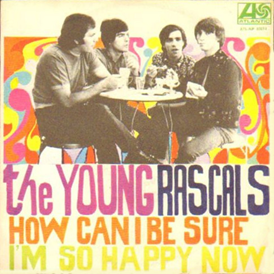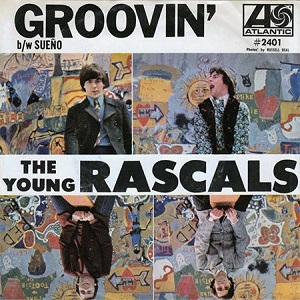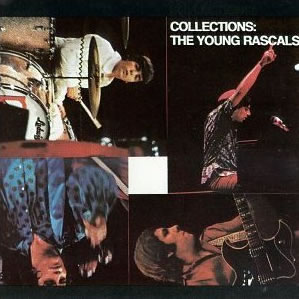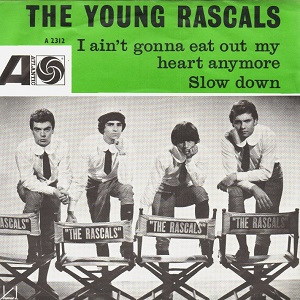
The Rascals are an American rock band, formed in Garfield, New Jersey, United States, in 1965.

Felix Cavaliere is an American musician. He is best known for being the co-lead vocalist and keyboard player for The Young Rascals.
Fotomaker was a power pop group from Long Island, New York who released three albums between 1978 and 1979.

Freedom Suite is the fifth studio album by rock band The Rascals, released on March 17, 1969. It peaked at number 17 on the Billboard Top LPs chart and also reached number 40 on the Billboard Black Albums chart, the last Rascals album to appear there.

Peaceful World is the eighth studio album by rock band The Rascals, released on May 5, 1971. It peaked at number 122 on the Billboard 200 chart. In Canada, the album reached number 50. The single "Love Me" reached number 95 on the Billboard Hot 100.

"How Can I Be Sure" is a popular song written by Felix Cavaliere and Eddie Brigati, and originally recorded by the Young Rascals for their 1967 album Groovin' with a single release in August 1967 affording the group their fourth Top 10 hit.

"Groovin'" is a song written by the American singer songwriters Felix Cavaliere and Eddie Brigati, initially recorded by their group the Young Rascals in 1967. Cavaliere was inspired to compose the song by his girlfriend Adrienne Buccheri, whom he only got to meet on Sundays amidst heavy touring and recording. Musically, the song differs from most of band's previous output, leaving the garage rock genre for Latin American influences, such as baião. Lyrically, "Groovin'" tells the tale of a narrator spending time with his partner on a Sunday afternoon. The song was arranged and recorded at the Talentmasters Studios, New York City in March of 1967.

Time Peace: The Rascals' Greatest Hits is a greatest hits album from the Rascals, released on June 24, 1968. It reached number one on the Billboard Pop Albums chart by September 1968. It also topped the Cash Box albums chart with a run in the Top 10 for 20 consecutive weeks

Once Upon a Dream is the fourth studio album by the rock band the Rascals, released February 19, 1968. The album rose to number 9 on the Billboard Top LPs chart and number 7 on the R&B chart.
David Brigati is an American singer. He is sometimes known as "the fifth Rascal".

The Young Rascals is the debut album by the American rock band the Young Rascals. The album was released on March 28, 1966, and rose to No. 15 on the Billboard Top LPs chart and No. 10 in Cashbox.

Collections is the second album by the rock band the Young Rascals. The album was released on January 9, 1967 and rose to #15 on the Billboard Top LPs chart, and to #8 in Canada.

Groovin' is the third album by the rock band the Young Rascals. The album was released on July 31, 1967 and rose to #5 on the Billboard Top LPs chart, number 7 on the R&B chart, and number 2 in Canada. Eight of the songs were released on singles with the title track reaching number 1 on the Pop chart in the U.S.

See is the sixth studio album by rock band The Rascals, released on December 15, 1969. It peaked at number 45 on the Billboard 200. In Canada, it reached number 11. Three singles were released from the album, although the third one was "I Believe" backed with "Hold On".

Dino Danelli was an American drummer. Danelli was best known as an original member and the drummer in the rock group The Young Rascals. He has been called "one of the great unappreciated rock drummers in history". He was inducted into the Rock and Roll Hall of Fame in 1997 with The (Young) Rascals.

Gene Cornish is a Canadian-American musician. He is an original member of the popular 1960s blue-eyed soul band The Young Rascals. From 1965 to 1970, the band recorded eight albums and had thirteen singles that reached Billboard's Top 40 chart. In 1997, as a founding member of The Rascals, Cornish was inducted into the Rock & Roll Hall of Fame.

"I Ain't Gonna Eat Out My Heart Anymore" is a song written by Pam Sawyer and Laurie Burton in 1965. Originally envisioned to be recorded by a British Invasion artist, the song was extremely well liked by the American rock group the Young Rascals, and they subsequently recorded the song and released it as their debut single in November 1965 through Atlantic Records. Though only a marginal hit, reaching number 52 on the Billboard Hot 100, it largely established the band on the American music scene. It has since been included on several albums by the band, including their eponymous debut album, and several compilation albums, including Time Peace: The Rascals' Greatest Hits, on which it was the opening track.

The New Rascals are an American musical group featuring Rock and Roll Hall of Fame inductees Dino Danelli and Gene Cornish from the original band The Rascals, with Bill Pascali of Vanilla Fudge 2001 and Charlie Souza formerly with Mudcrutch and White Witch.

The Very Best of The Rascals is a compilation album from the Rascals released on July 20, 1993 by Rhino/Atlantic. This compilation contains nearly all of their Atlantic singles, in chronological order, released from 1965 through 1970. The first nine singles are performed by the Young Rascals, while the last seven tracks are credited to the Rascals.

The Island of Real is the ninth and final studio album by rock band The Rascals, released in 1972. It peaked at number 180 on the Billboard 200 chart. The group's final four singles — “Lucky Day,” “Brother Tree,” “Hummin’ Song” and “Jungle Walk” — failed to make the Top 100 and the Rascals disbanded.


















